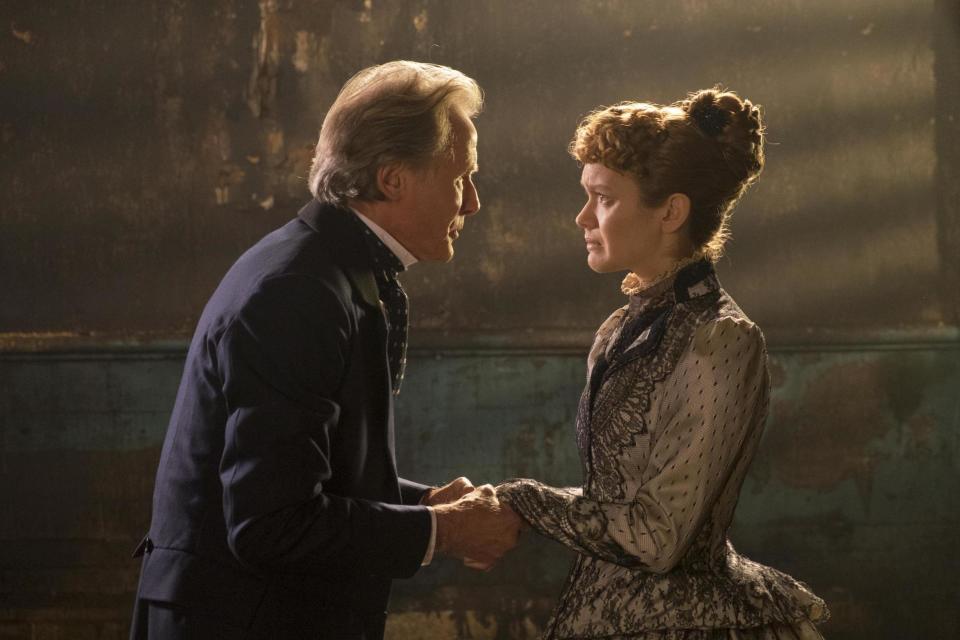The Limehouse Golem review: A riotously gory story
Three minutes into The Limehouse Golem, a riotously gruesome Thames-side melodrama set in 1880, the yearning for the chap in the deerstalker kicked in. But I exaggerate. The first pang struck after 90 seconds as narrator Dan Leno, toast of the London music hall, lays out the tracks of the two distinct police enquiries that will later coalesce.
The body of journalist turned playwright John Cree is discovered in his home. His comely young wife, Elizabeth, Leno’s music hall protégée under the imaginatively sobriquet of Little Lizzie, is suspected of poisoning him.
Strike a light, guvnor, but as if all that weren’t enough to be gawn on with, a crazed slasher’s only on the loose dahn the old East End! Eight years before Jack the Ripper went to work, the Limehouse Golem, so Leno informs us, “is the name on every Londoner’s lips”.
What with all the gaslight, gloom and grand guignol gore — sorry, it must be the music hall influence but I’ve come over all Leonard Sachs from The Good Old Days (Google him, dearies) with the asinine alliteration — could the scene be better set for Sherlock Holmes?
Yet in this curious tale, told primarily in flashback, Holmes is the dog that never barks. Three explanations for his absence come to mind. One is that he recently encountered another golem (originally a monster brought to life from clay in medieval mittel European Jewish myth) in the BBC series.
Alternatively, it may be because Holmes doesn’t feature in the 1994 Peter Ackroyd novel from which the film is adapted. Or could it be that Sherlock would have cracked this case in a quarter of an hour without departing his Baker Street armchair, leaving 90 minutes of screen time to be filled with the potter’s wheel?
Leading the investigation in his stead is one of those Scotland Yard dimwits he treats with such disdain. Inspector John Kildare (Bill Nighy), a morose and world-weary but thoroughly decent copper, is supposed to be smart. His impudent constable George Flood (Daniel Mays) says he’d have become a star at the Yard but for the rumours about him “not being the marrying kind”. But despite the best efforts of screenwriter Jane Goldman and director Juan Carlos Medina to enshroud it in a pea-souper of opacity, the case Kildare never quite solves seems fairly transparent.
Thankfully, there is more to the film than a murder mystery. There is too much to it, in fact. Reducing a complex, richly textured novel to a 109-minute movie requires the Golem’s freedom of movement with a blade. Big chunks need lopping off. But Goldman is an effete butcher, and tries to ram every piece of gizzard and offal into the pot.
The result is an energetic and very flavourful mess. Tumbling over one another are sub-themes of muscular proto-feminism, the delectably amoral notion of murder as performance art and, above all, sexual ambiguity. Every major character is confused, repressed or deviant.
Along with the blood-drenched killings and backstage music hall intrigues — involving lascivious dwarf Victor (Graham Hughes), a pervy manager inevitably known as “Uncle” (Eddie Marsan), and jealous Hispanic acrobat Aveline (María Valverde) — Lizzie’s frigidity is explained with a flashback to her early life as the genitally mutilated child-prostitute daughter of a religious maniac mother (see Carrie for the inspiration there).
As the movie hurtles out of control through its squalid back alleys like a hansom cab whose driver fainted from joy after being promised a gold sovereign to reach Waterloo Bridge by sundown, it is rescued from disaster by two elements.
Never for a moment is it less than fun to watch. The lurid killings, each shown as Kildare imagines them committed by a different suspect, are comically grotesque. The trickle of pastiche becomes a torrent when Karl Marx is interviewed on suspicion of a capital crime. Along with the novelist George Gissing and Leno, the father of Communism was in the British Museum Reading Room at the same time as the Golem was there scrawling demented confessional notes in the margins of a book.
Never for a moment is it less than fun to watch. The lurid killings are comically grotesque
Spearheading the rescue mission like Israeli commandos at Entebbe are the central performances. Lovable as he is, Nighy is not an actor you would necessarily trust with more than a droll cameo. But in his finest outing as a closeted gay man since his South Wales miner in 2014’s Pride, he reins in the camp and jettisons the gurning to stretch what little material the script gives him into a solid and touching portrayal of a humane man trying to find hope and sense in a darkly chaotic world.
As the gamine Lizzie, the fellow sexual outsider he identifies as a kindred soul and fights to keep from the gallows, Olivia Cooke is wonderful. Switching nimbly between naivety and knowingness, as adept at singing saucy music-hall songs as at shying away from their source material in the bedroom, she has the quietly commanding screen presence of the younger Carey Mulligan.
With a less assured and captivating lead the film would sink. Goldman is a talented screenwriter but the finely attuned ear for contemporary street argot which made the first Kingsman movie a triumph (and will hopefully do the same for the imminent sequel) doesn’t stretch back as far as Victorian London.
As for the grand reveal, this is unwittingly telegraphed from so far out that it carries the shock power of the denouement to an elaborate music-hall magician’s act. What baffles Kildare to the end would have been a one-pipe problem to Holmes, even if that pipe was filled with choicest opium on one of his trips to find oblivion in a Limehouse den.
Cert 15, 109 mins

 Yahoo News
Yahoo News 

